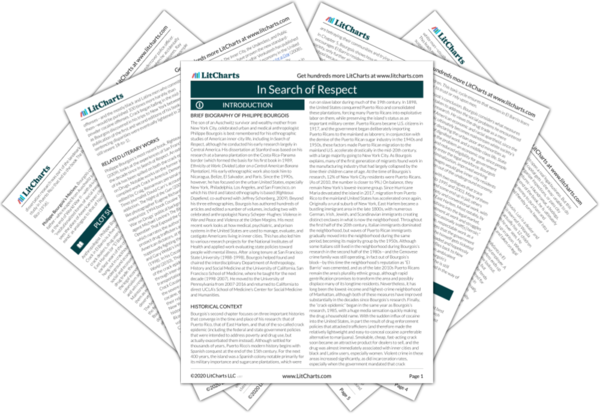Anthropological Research and its Consequences
Philippe Bourgois’s In Search of Respect is the result of the years-long intensive ethnographic research the author conducted in order to “build an alternative, critical understanding of the U.S. inner city.” From 1985-1990, a period now retrospectively considered the beginning of the “crack epidemic,” Bourgois moved to El Barrio, or East Harlem, a largely impoverished and historically Puerto Rican neighborhood of his native New York City. He chooses ethnography because the…
read analysis of Anthropological Research and its ConsequencesThe Crack Trade and the Underground Economy
Bourgois’s initial motivation for studying El Barrio was his desire to understand what he calls the underground economy: the semi-legal and outright illegal industries that dominate El Barrio’s streets, and in which many of its residents participate at one time or another in their lives. While the public tends to see drug dealing as a bad choice made by malicious people, Bourgois shows that it is in fact the natural option for youth…
read analysis of The Crack Trade and the Underground EconomyPoverty, History, and Public Policy
Although many Americans are quick to blame poverty on a lack of effort or moral fortitude, Bourgois argues that historical factors and institutional failures are the primary sources of El Barrio’s poverty and its residents’ lack of opportunities. Yet the common American narrative tying personal responsibility to economic outcomes in fact drives much of the mistaken policy that entrenches and multiplies poverty in the American inner city. Accordingly, Bourgois attempts to combat this narrative…
read analysis of Poverty, History, and Public Policy
Street Culture and Drug Use
Bourgois notes that life in El Barrio is not structured around the cultural norms that prevail in the rest of the United States, but rather follows a distinct “street culture” developed in opposition to the mainstream. He defines this culture as a system of “beliefs, symbols, modes of interaction, values, and ideologies” within which El Barrio residents can seek the dignity and respect denied to them in society at large. Indeed, the drug…
read analysis of Street Culture and Drug UseGender Roles and Family Violence
In the final three chapters of his book, Bourgois focuses on another profound contradiction in the lives of the people he befriends in El Barrio: they deeply believe in the patriarchal nuclear family in theory and completely reject it in practice. Violence against women and children is disturbingly commonplace in El Barrio, one of many symptoms of a traditional rural patriarchy struggling to maintain male dominance in a modern urban environment dominated by a…
read analysis of Gender Roles and Family Violence






